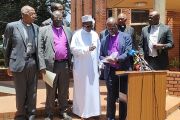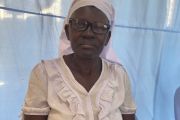DESIP is a UK Aid-funded programme focused on delivering equitable and sustainable Increases in family planning in low Contraceptive Prevalence Rate (CPR) counties in Kenya.
The program’s outcome is greater and more equitable access to and uptake of family planning services in Kenya with a focus on adolescents, women living below the poverty line (>$1.90 per day), and People with disabilities (PWD).
Through innovative and evidenced-based market facilitation, and better-targeted service delivery that reach the poorest of the poor, the DESIP project is developing a more sustainable and healthier FP market in Kenya.
DESIP implementing counties and partners

Programme goal
To ensure that women and girls are able to safely plan their pregnancies and improve their SRHR, particularly the young, rural and marginalized, with programme impact contributing to reduced maternal mortality, newborn and child mortality and increased mCPR in Kenya.
Programme objective
To increase access to and use of modern contraceptives across Kenya, while increasing equity and sustainability.
- DESIP’s four expected outputs are:
- Greater availability of FP commodities
- Greater demand for FP commodities
- Sustainability of the private sector
- Improved and sustainable national ownership (strengthened public sector)
CHAK is implementing the DESIP project in Turkana and Narok Counties in 14 and 24 health facilities respectively.
Achievements and activities over the last 12 months
Clients accessed Family Planning (FP) services from DESIP-supported faith facilities in Narok and Turkana counties. A wide range of methods were offered, with the exception of permanent methods.
Majority of the clients (53 per cent) opted for FP injections. Health Care Providers, faith leaders and community members explained that men in these communities were not supportive of FP, pushing women to choose methods that were discreet such as the FP injection.
Only 10 per cent of the FP services were offered to adolescent clients (10-19yrs) with 8 per cent of them aged 15-19 years. Turkana and Narok have high teenage pregnancy (40 per cent in Narok among girls aged 15-19yrs and 20 per cent in Turkana among girls aged 15-19yrs). This points to a high unmet need for FP among adolescents and young women.
CHAK has led a faith-based service delivery and SBCC strategy to address barriers at community and service delivery levels. In order to achieve DESIP’s ambitious targets, the project works with faith leaders to obtain their support and ownership, leveraging Kenya’s faith organizations’ service delivery channels as well as large pastoral networks comprised of schools, FM stations, women’s, men’s and youth groups, groups of people living with disabilities.
Community Health Volunteers (CHV) have also been trained to champion FP services at community level. Capacity building of health care workers on LARC has been done.
Community dialogue
CHAK has conducted community dialogue sessions where issues affecting family planning uptake, both in the facility and at the community level, were discussed.
The low uptake of family planning services has been attributed to negative perception, cultural practices, myths and misconceptions. The CHVs agreed to include FP services awareness in their health talks and refer potential clients to health facilities.
Male engagement
Special male only engagement meetings were also held to give the right information to men and urge them to support their women to take up family planning services.
Community Based Distributors (CBDS) training For Depot Medroxyprogesterone Acetate (DMPA-IM)
The Division of Reproductive and Maternal Health (DRMH) and Narok CHMT with support from CHAK-DESIP project trained 36 Community Health Volunteers from nine Community Health Units (CHU) in four sub-counties of Narok County to become community distributors of DMPA-IM.
Table showing CHVs trained as community-based distributors in Narok County
|
No. |
Community Health Unit |
Link Facility |
No. CHVs/CBDs |
|
1 |
Naikarra |
Naikarra |
5 |
|
2 |
Aitong |
Aitong |
5 |
|
3 |
Talek |
Talek |
5 |
|
4 |
Ngiito |
Tenwek H/C |
2 |
|
5 |
Siyaipei |
Siyaipei |
5 |
|
6 |
Olasiti |
Olasiti |
2 |
|
7 |
Olendem |
Olendem |
5 |
|
8 |
Ewaso Nyiro |
Ewaso Nyiro |
2 |
|
9 |
Narok Town |
Fountain |
5 |
|
Total |
36 |
||
The CBDs were trained to undertake the following activities at the community level:
- Counsel clients on the full range of FP methods
- Educate and motivate clients to accept and use family planning methods
- Provide IEC on the use and effectiveness of contraceptives and prevention of STI/HIV/AIDS
- Provide selected contraceptives to clients by use of a screening checklist
- Offer DMPA
- Refer clients for family planning and other RH services as appropriate
- Keep and maintain records on new and old acceptors, referrals, dropouts and motivational activities
- Follow up on family planning clients
- Prepare and submit a monthly summary of activities carried out
- Attend monthly CHV meetings and participate in discussion around problems, constraints and their experiences in the CHV program
- Order and store contraceptives
- Collaborate with other individuals, organizations and government ministries in provision of FP services
- Carry out other Primary Health Care (PHC) services in addition to FP services
- Form village networks for sharing experiences
Integrated outreaches, World Contraception Day commemoration events and radio programs have been used in both Turkana and Narok counties to pass on education on FP services, improve awareness of contraception and enable people to make informed choices on their sexual and reproductive health.











